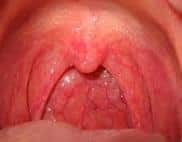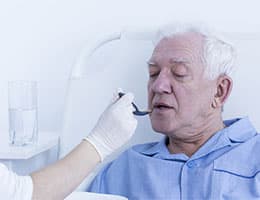 The complication or impediment of swallowing is called dysphagia . This verb , for its part, refers to the involuntary and voluntary movements that allow an element that is in the mouth to pass into the stomach.
The complication or impediment of swallowing is called dysphagia . This verb , for its part, refers to the involuntary and voluntary movements that allow an element that is in the mouth to pass into the stomach.
Dysphagia, therefore, is a disorder that makes eating difficult . This problem usually arises from a disease of the esophagus or some organ that is around it, although the causes can be diverse.
If the person experiences problems passing food from the mouth and pharynx into the esophagus, it is called oropharyngeal dysphagia . On the other hand, if the difficulty occurs in the descent of food through the esophagus, the disorder is known as esophageal dysphagia .
Dysphagia can include pain when swallowing, choking, drooling, extended chewing, throat clearing, inability to close the lips, and even rejection or expulsion of food through the tongue. To determine its origin, the doctor may use different studies, such as an esophageal manometry , an x-ray or an esophagogastroduodenoscopy .
A study performed with the aim of measuring strength, muscle tone or pressure in certain areas of the esophagus while it is at rest is known as esophageal manometry . Likewise, it allows recording the characteristics of internal movements during the swallowing process, taking into account the activity of the muscles involved in it.
Esophagogastroduodenoscopy, for its part, is also called gastroscopy and is an examination that is used to observe the duodenum, stomach and esophagus. The procedure is carried out with the help of an endoscope and a series of flexible tubes with a lamp and a video camera at the end that allow the operator to film the cavities and view them on a monitor.
Cancer , Parkinson's disease, cerebrovascular accident (CVA), gastroesophageal reflux , thyroid gland problems, amyotrophic lateral sclerosis (ALS), Alzheimer's disease and tonsillitis are some of the possible causes of dysphagia. It is important to discover the underlying pathology to define the treatment , which may include changes in diet, drugs or surgical intervention.
At the dietary level, it is generally suggested that the patient not eat alcohol or spicy foods and that they modify the consistency of foods and drinks to promote swallowing and thus minimize dysphagia. It is important to note that if not treated properly, dysphagia can seriously compromise the patient's body, both due to poor nutrition and lack of hydration.
Among the many tips that experts often give their dysphagia patients to improve their relationship with food are the following:
 * avoid stressful situations at mealtime, something in which the person in charge of caring for the patient must collaborate;
* avoid stressful situations at mealtime, something in which the person in charge of caring for the patient must collaborate;
* never eat quickly, but assume that swallowing will take longer than normal, but allow the body to complete the process at its own pace;
* remain seated during the meal and for a minimum of half an hour during the beginning of digestion , to ensure that the food has descended sufficiently along the esophagus;
* for those people with dysphagia who are in bed, it is necessary to help them sit up as much as possible since giving them food while they are lying down is an unacceptable decision;
* If we must feed a dysphagia patient , we must bring the cutlery to him from below, to prevent him from being forced to raise his head.
